Lifestyle
Franz Kafka's life wasn't so kafkaesque after all, TV miniseries shows
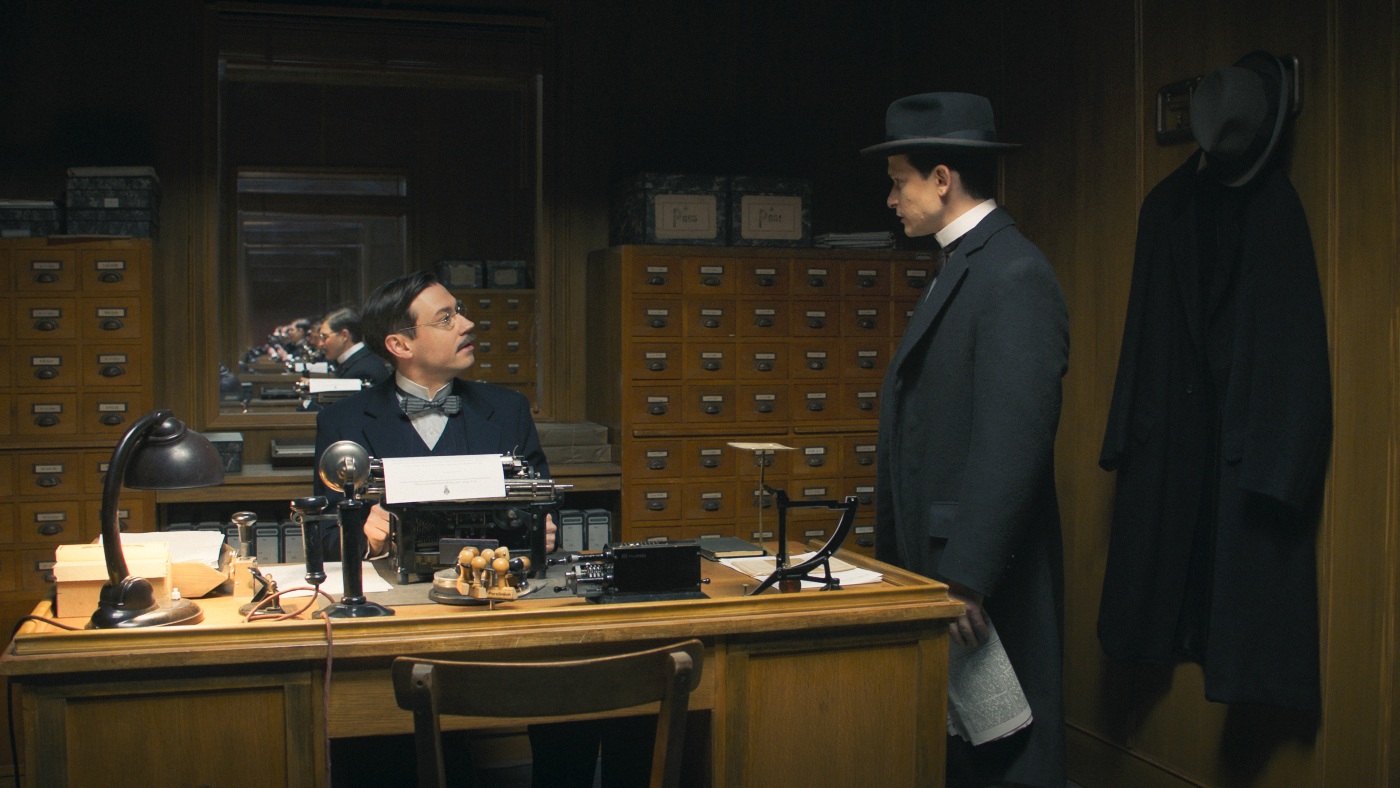
Max Brod (left), a recognized writer at the time, relentlessly promoted the writings of his friend, Franz Kafka, played here respectively by David Kross and Joel Basman in the Austrian-German series Kafka, now streaming in the U.S.
ORF/Superfilm/Nicole Albiez/Superfilm
hide caption
toggle caption
ORF/Superfilm/Nicole Albiez/Superfilm
If you’ve ever felt powerless when confronted with faceless bureaucracy, confounded by absurd accusations or simply hopeless, chances are the word “kafkaesque” might sum up your situation.
But a television miniseries released in the U.S. this month shows Prague-born author Franz Kafka, whose work inspired the word, as anything but kafkaesque. Tortured recluse he is not here.
Instead, Kafka is a wrangler of labyrinthian bureaucratic systems, so successful in fact that his bosses do all in their power to keep him at home and prevent him from enlisting in World War I. That’s the story according to Kafka, a six-part series that was co-produced by Germany’s ARD, Austria’s ORF and Superfilm.
“We all think we hear of the bureau, or the office, that it’s a dark world and it’s apocalyptic (for Kafka). But in the real world, it was a paradise,” Director David Schalko told NPR’s Michel Martin during a joint interview with Joel Basman, who plays the title role.
Schalko said he was inspired to take on the project after reading Reiner Stach’s three-volume biography of Kafka, originally published in German between 2002 and 2014. In rejecting the usual tropes of equivocating Kafka’s angst-ridden works with the writer’s life, Schalko’s biopic offers a lush, more humanly complex picture.
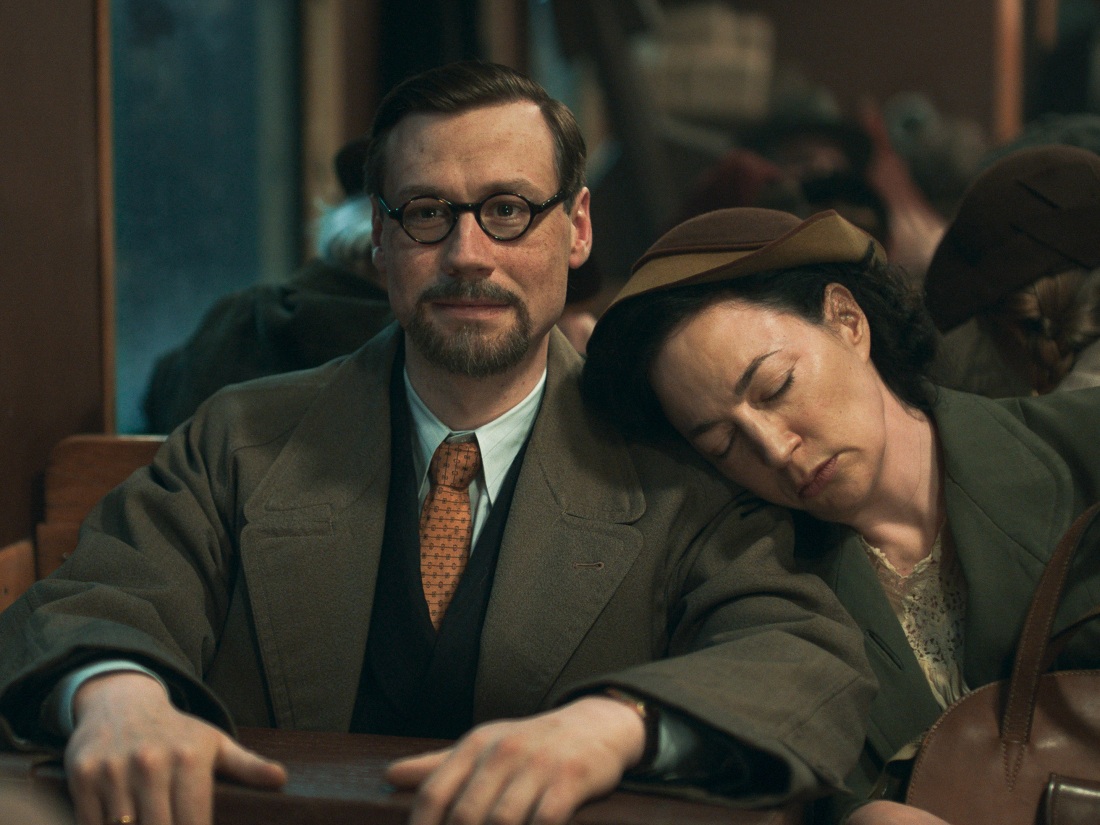
Max Brod (David Kross) and his wife Elsa (Tamara Stern) escaped Prague on one of the last trains to leave the city before Nazi forces took control, recognizing the danger to Jews like himself. He carried Franz Kafka’s papers with him in a suitcase.
Copyright ORF/Superfilm/Nicole Albiez/Superfilm
hide caption
toggle caption
Copyright ORF/Superfilm/Nicole Albiez/Superfilm
One perspective per episode
ChaiFlicks
The first theme is the author’s relationship with his close friend Max Brod — who ultimately defied Kafka’s wish to have all his manuscripts burned and instead posthumously became his biographer and literary executor.
The other episodes focus on the his (bourgeois) family, three of his lovers and his role as an insurance lawyer.
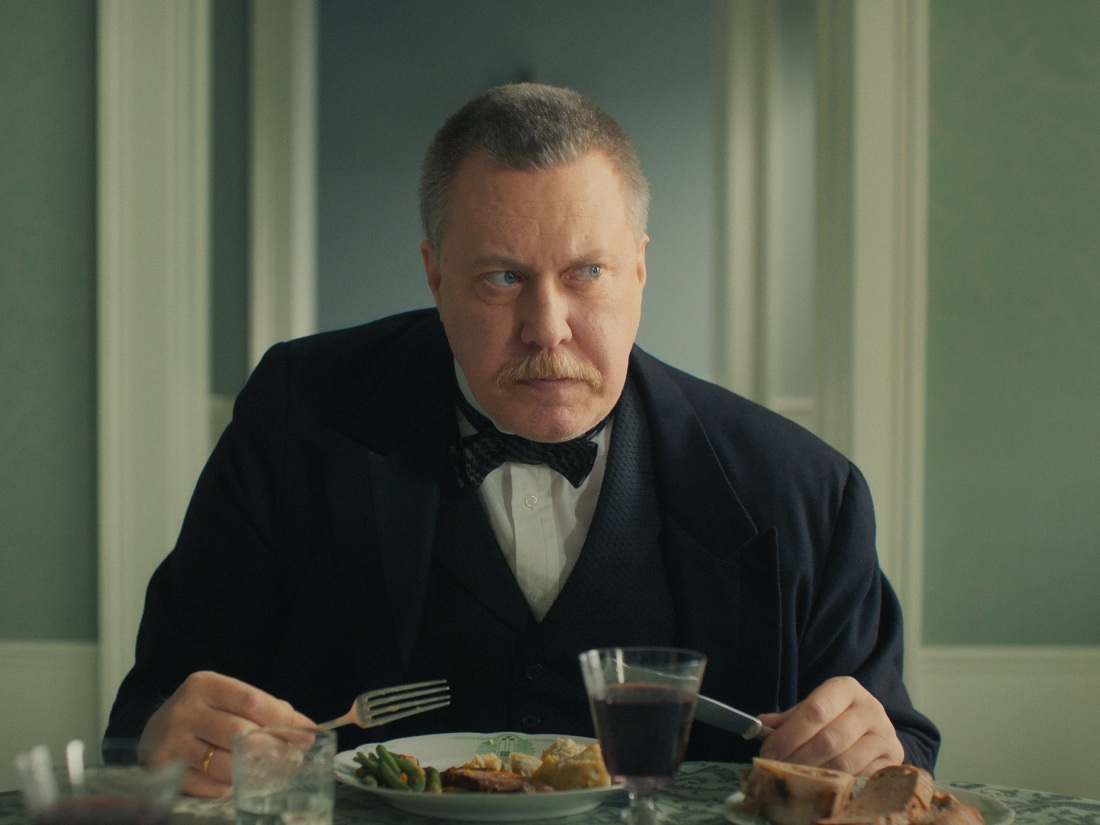
Kafka’s domineering father Hermann (Nicholas Ofczarek) plays a central role in his life and writings.
Copyright ORF/Superfilm/Nicole Albiez/Superfilm
hide caption
toggle caption
Copyright ORF/Superfilm/Nicole Albiez/Superfilm
In episode four, Kafka wins successive court cases and contracts for the company. He is held in high esteem by his superiors at the Workers’ Accident Insurance Institute. They also admire his writings and press him to review their own mediocre texts. It’s an admiration that Kafka does not reciprocate.
“He was very good rhetorically and he was fighting for the insurance company,” Schalko said. “It’s not the silent Kafka who is not able to talk in front of other people. It shows a complete different Kafka.”
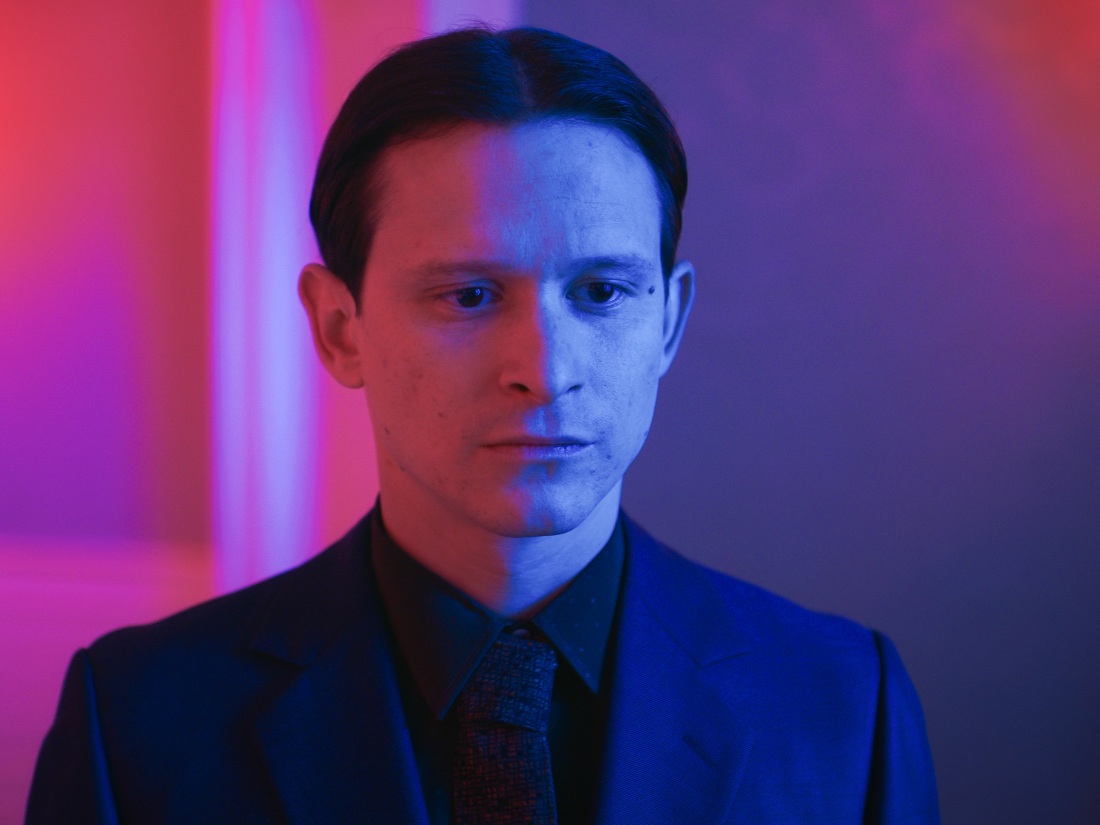
The series alternates between biographical material, historical context and scenes from Kafka’s writings.
Copyright ORF/Superfilm/Nicole Albiez/Superfilm
hide caption
toggle caption
Copyright ORF/Superfilm/Nicole Albiez/Superfilm
Basman says he felt compelled in portraying Kafka to “get away from the cliché of him being a depressed person. First of all, he’s a funny man. He’s got humor. And of course, he’s got his issues, and we all got them in our lives, but he was far away from depressed.”
A century since Kafka’s death
The series’ release coincides with the 100th anniversary of Kafka’s death this month. And it comes at a time of renewed interest in the writer, who has become an unexpected hot item among a younger generation reflecting on alienation via posts on TikTok.
Just last year, readers could finally access a new translation of Kafka’s diaries, by Ross Benjamin. Prior versions relied on a manuscript heavily edited and redacted by Kafka’s friend Brod, whose version was polished and removed lewd, homoerotic and unflattering material concerning Kafka and himself.
The unfiltered version shows a more hesitant Kafka who often left his thoughts unfinished mid-sentence — not surprising for an author who never didn’t complete the three novels he started and whose characters struggled with the impossibility of finishing tasks.
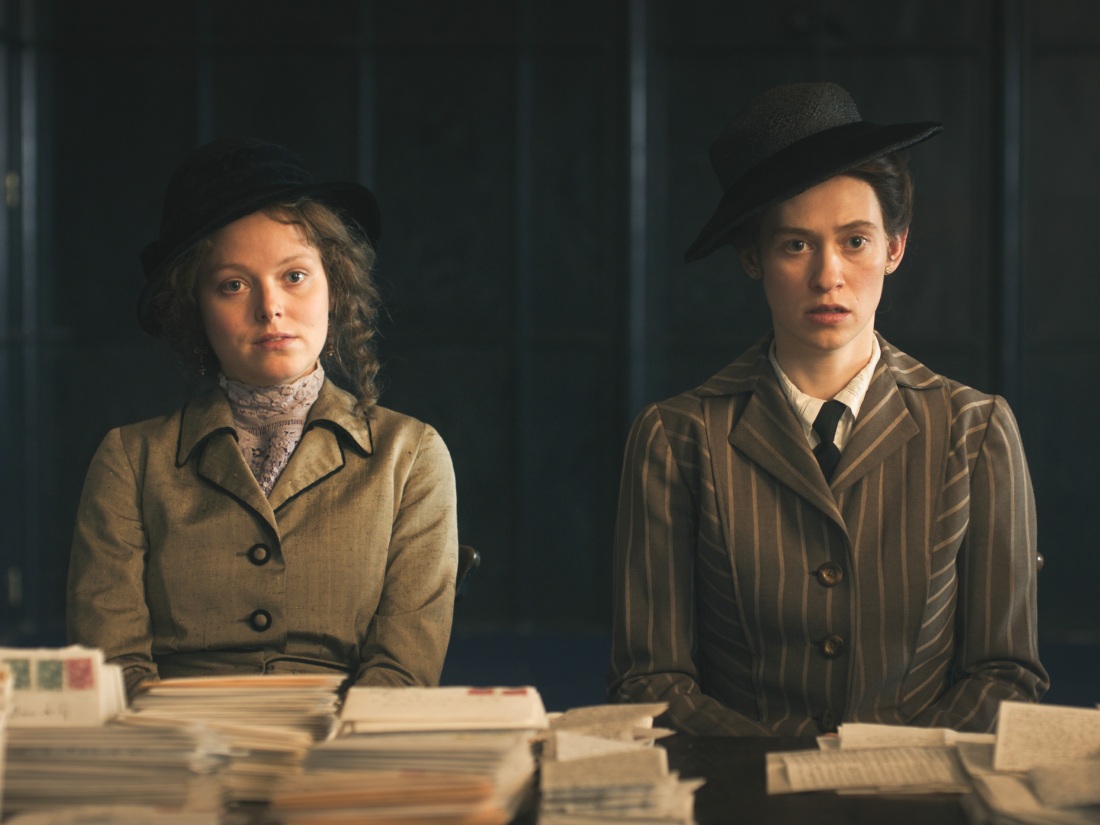
Kafka’s longtime fiancée Felice Bauer (Lia von Blarer, right) got so fed up with his constant equivocation that she confronted him alongside her friend, Grete Bloch (Marie-Luise Stockinger), an event that inspired the novel The Trial.
Copyright ORF/Superfilm/Nicole Albiez/Superfilm
hide caption
toggle caption
Copyright ORF/Superfilm/Nicole Albiez/Superfilm
“The feeling to wake up and feel like vermin, like an insect, and feeling the shame and get canceled by the others, is a feeling you know from social media very well,” Schalko said, while pointing to arbitrary arrests in Russia as another example.
“He also writes about the bureaucracy and how it feels to be a human being in a system that doesn’t see you as a human being. And that’s a big issue in our times as well.”
In a memorable scene in episode three, Kafka brings home for dinner a traditional Yiddish theater actor he befriended, Yitzhak Löwy. But Kafka’s domineering father, Hermann, disapproves and says Löwy is dirty and compares him to an insect.
The confrontation inspired Kafka to write his novella The Metamorphosis, the story of a man who turns into a bug. Kafka had also written a 100-page letter criticizing his father — the closest he came to writing an autobiography — though he neither sent nor published it.
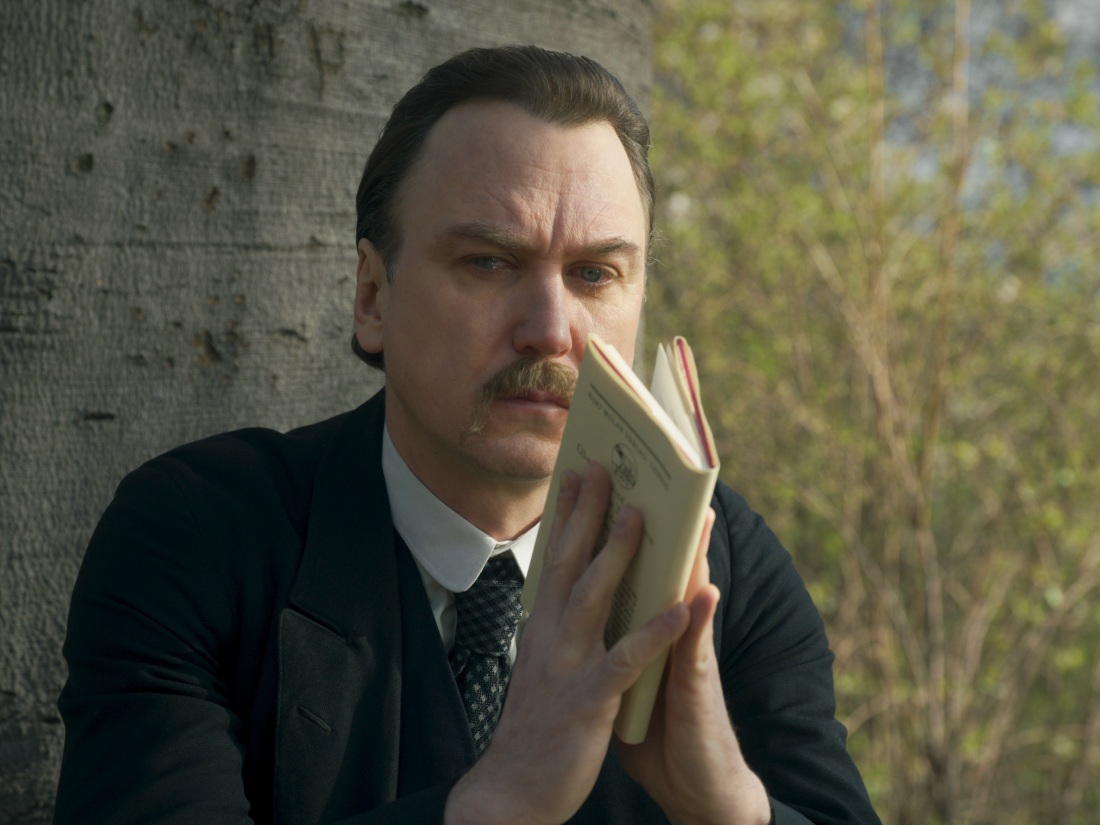
The poet Rainer Maria Rilke, played by Lars Eidinger, is shown moved to tears after reading Kafka’s The Metamorphosis, the story of a man who turns into an insect that was inspired by a confrontation between Kafka’s domineering father and the writer’s Yiddish actor friend Yitzhak Löwy.
Copyright ORF/Superfilm/Nicole Albiez/Superfilm
hide caption
toggle caption
Copyright ORF/Superfilm/Nicole Albiez/Superfilm
“For his father, it was more important to be accepted by the elites of Prague; he tried to maybe even hide his Judaism,” Basman said.
The Swiss-born actor says he could relate to this ambiguity in Kafka’s family identity because his own father is originally from Israel but he’s an atheist.
“I was never Jewish enough, but I also was never Swiss enough… I realized, okay, people want to brand you and if they can’t brand you, they don’t want you on their team,” Basman said.
“I think for Kafka, religion was also just a journey of getting to know himself because it was hidden by his father so strongly that he took this journey by himself.”
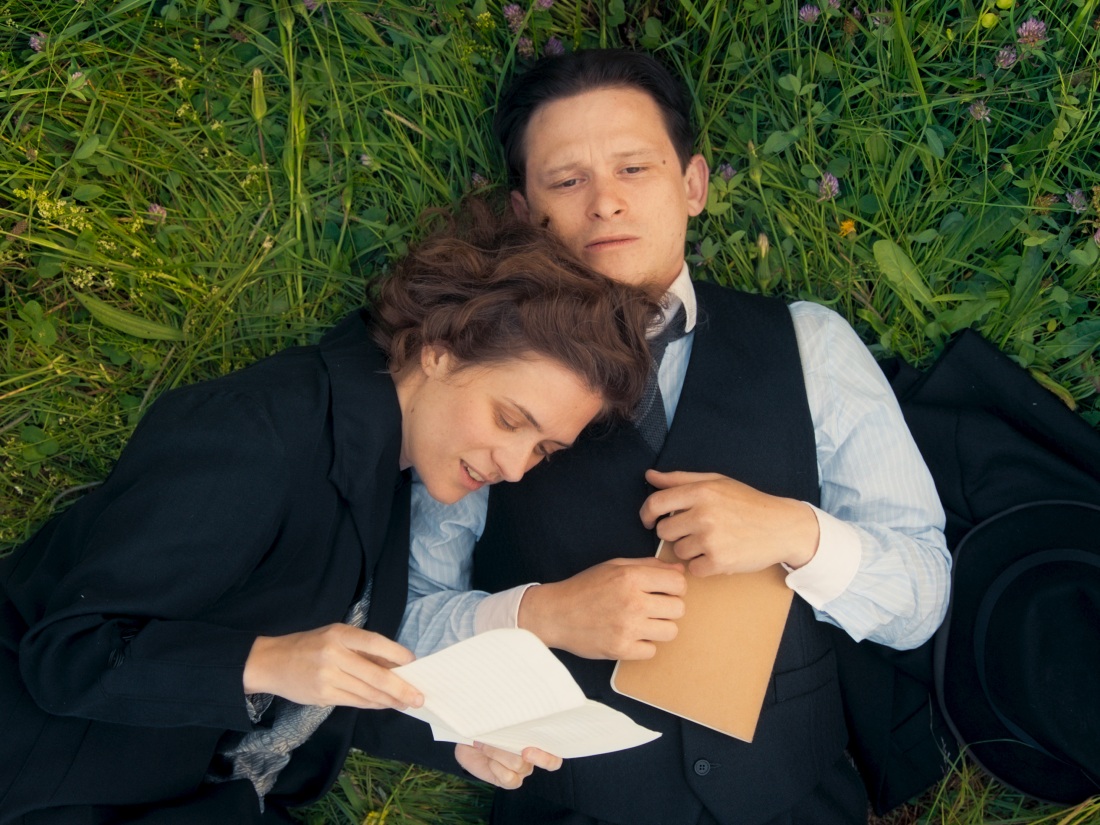
Kafka was engaged four times and never married, keeping most relationships long-distance via extensive letter-writing. His penultimate relationship was with the writer Milena Jesenská (Liv Lisa Fries), who recognizes his talent.
Copyright ORF/Superfilm/Nicole Albiez/Superfilm
hide caption
toggle caption
Copyright ORF/Superfilm/Nicole Albiez/Superfilm
Kafka and women
The women in Kafka’s life also left an indelible mark. He was engaged several times but never married. One of his fiancées was Felice Bauer, Brod’s cousin. The pair meet and only get to know each superficially before Kafka sends her hundreds of agonizing letters for months on end, through an initial parting, a second engagement and a final breakup.
Fed up with Kafka’s constant equivocation, Bauer at one point confronts him, letters in hand, with her friend Grete Bloch — another recipient of letters from Kafka — by her side. The episode drawn from the writer’s life inspired his novel The Trial, published posthumously in 1925.
The protagonist Joseph K. navigates an absurdly complex bureaucratic system and makes mistakes that make him look guilty of an unknown crime for which he is put on trial and then executed “like a dog.”
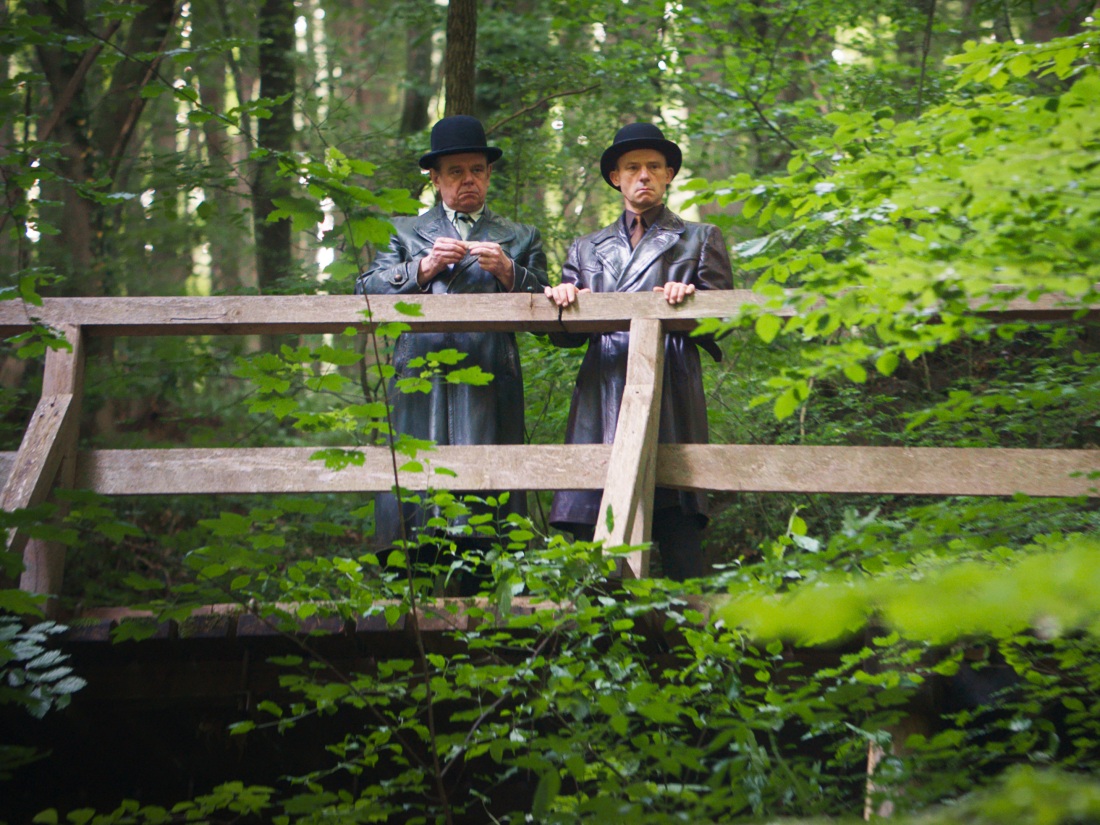
Two men in leather coats (Raimund Wallisch, left, and Gerhard Liebmann) lurk in the background, a representation of the angst and absurdities of bureaucracy that concerned Kafka.
Copyright ORF/Superfilm/Nicole Albiez/Superfilm
hide caption
toggle caption
Copyright ORF/Superfilm/Nicole Albiez/Superfilm
Kafka is available to stream on ChaiFlicks. New episodes will release weekly.
The broadcast version of this story was produced by Mansee Khurana. The digital version was edited by Obed Manuel.

Lifestyle
'Wait Wait' for July 27, 2024: With Not My Job guest Kathleen Hanna
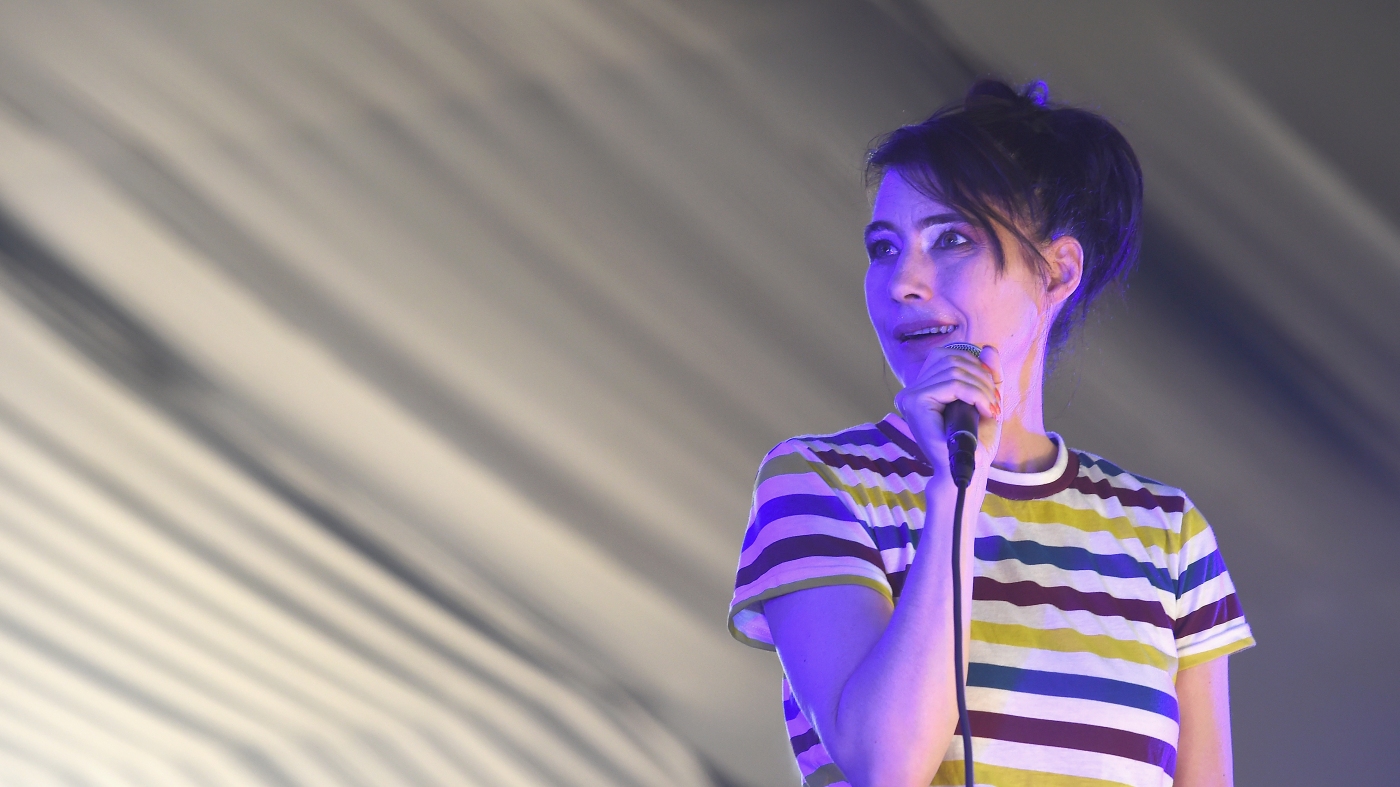
Kathleen Hanna of The Julie Ruin performs onstage at the 2016 Panorama NYC Festival – Day 2 at Randall’s Island on July 23, 2016 in New York City. (Photo by Nicholas Hunt/Getty Images)
Nicholas Hunt/Getty Images/Getty Images North America
hide caption
toggle caption
Nicholas Hunt/Getty Images/Getty Images North America
This week’s show was recorded in Chicago with host Peter Sagal, judge and scorekeeper Bill Kurtis, Not My Job guest Kathleen Hanna and panelists Meredith Scardino, Peter Grosz, and Mo Rocca Click the audio link above to hear the whole show.
Who’s Bill This Time
Momala Takes Over; Assigned Seats Are Back; And The Heat Is On
The Olympic Torch Reporch
Our Summer Olympics Preview
Bluff The Listener
Our panelists tell three stories about someone committing an office faux pas, only one of which is true.
Not My Job: We quiz Bikini Kill’s Kathleen Hanna on Hanna-Barbera
Punk icon Kathleen Hanna plays our game called, “Kathleen Hanna Meet Hannah-Barbera.” Three questions about the animation studio.
Panel Questions
Hide Your Receipts; VR Meets ER; Avocado Apologies
Limericks
Bill Kurtis reads three news-related limericks: Situation Room Cocktails; Burrito Bird; Hopped Up Sharks
Lightning Fill In The Blank
All the news we couldn’t fit anywhere else
Predictions
Our panelists predict what will be the big story out of the Paris Olympic Games
Lifestyle
L.A. Affairs: At 77, I had a crush on my best friend’s widower. Did he feel the same way?

At 77, I had given up. After two failed marriages and years of unsuccessful dating, I accepted what seemed to be my fate: single for almost 40 years and single for however many remained. You don’t get it all, I told myself. I was grateful for family, friends and work. Life settled into what felt like order.
Until Ty.
As the husband of my best friend, he was no stranger, but he was usually peripheral. Then 10 years ago, my friend got lung cancer. I watched during visits, stunned at how nurturing Ty could be, taking care of her even though they had separated years before at her request.
After she died, Ty and I stayed in touch sporadically: a surprise sharing of his second granddaughter a year after we scattered my friend’s ashes, an invitation to the launch of my book a year later. Ty attended, hovering in the back, emerging after everyone left to attentively help load my car.
Two more years passed. During quiet moments, I remembered his sweetness. I also remembered his handsome face and long, tall body. Confused about what I wanted, I texted Ty, who’s an architect, under the guise of purchasing a tree for my backyard.
We spent an afternoon at the nursery, laughing, comparing options and agreeing on a final selection. When the tree arrived, I emailed a photo. He emailed a thank you.
Another three years passed, broken only by news of his third granddaughter and my memories of how good it felt to be with him. Alert to his attentiveness, but unsettled by both his remove and my growing interest, I risked reaching out again, this time about remodeling my garage.
Ty spent several hours at my house making measurements, checking the foundation and sharing pictures of his home in Topanga. His sketches for the garage arrived two weeks later via email.
I was grateful for his help but unsure over what sort of friendship we were developing, at least from his point of view. I, however, was clear. I wanted him to wrap his long arms around me, tell me sweet things and make me his.
Instead, I sent a gift card to a Topanga restaurant to thank him for his drawings.
“Maybe we should spend it together,” he texted.
We dined in the dusk of late summer. Our talk was easy. Discomfort lay in the unspoken. Anxious for clarity, I repeatedly let my hand linger near the candle flickering in the middle of our table. It remained untouched.
And that was as far as I was willing to go. I refused to be any more forward, having already compromised myself beyond my comfort level with what seemed, at least to me, embarrassingly transparent efforts to indicate my interest. Not making the first move was very important. If a man could not reach out, if he didn’t have the self-confidence to take the first step, he would not, I adamantly felt, be a good partner for me.
Two weeks later, Ty did email, suggesting an early evening hike in Tuna Canyon in Malibu. The setting was perfect. Sun sparkled off the ocean. A gentle breeze blew. We climbed uphill for sweeping coastal vistas and circled down to the shade of live oaks, touching only when he took my hand to steady me where the path was slippery. At the end of the trail, overlooking the juncture between the mountains and the sea, we stood opposite each other and talked animatedly for almost an hour, both of us reluctant to part.
Our conversation was engaging, but my inner dialogue was louder. When, I kept thinking, is this man going to suggest we continue the evening over dinner? We didn’t have to go out. We could eat at his house. It was 7 p.m., for God’s sake. Passing hikers even stopped to remark on our matching white hair and how well they thought we looked together. It was like a movie scene where the audience is yelling, “Kiss her, kiss her,” rooting for what they know is going to happen while the tension becomes almost unbearable. But bear it I did.
Each of us ate alone.
A few weeks later, at his suggestion, we were back at Tuna Canyon. This time Ty did invite me to end the evening at his house. Sitting close on his couch, but not too close, we drifted toward each other in the darkening room. His shoulder brushed mine reaching for his cup of coffee. My hip pressed his as I leaned in for my tea. Slowly, sharing wishes and hopes for our remaining years, we became shadows in the light of the moon. And in that darkness, in that illuminated space, he reached out.
This reticent man, this man who was so slow to move toward me, this sensitive man who hid himself behind layers so opaque I was unsure of his interest, released all that he had inside him.
“I wanted you,” Ty repeated again and again. “I was afraid of ruining things. You were her best friend. I didn’t want to lose your friendship.”
Our pent-up tension exploded.
Stunned and thrilled, I leaned into the space he opened.
Three years later, it is a space we continue to share: a place where neither of us has given up, a place where he wraps me in his long arms, a place we hold carefully against our diminishing days.
The author is the owner of a preschool in Venice as well as a psychotherapist, photographer and writer. Her first book, “Naked in the Woods: My Unexpected Years in a Hippie Commune,” was published in 2015. Her newest manuscript, “Bargains: A Coming of Aging Memoir Told in Tales,” is seeking a publisher. She lives in Mar Vista and can be found at margaretgrundstein.com, Instagram @margwla, Medium @margaretgrundstein and Substack @mgrundstein.
L.A. Affairs chronicles the search for romantic love in all its glorious expressions in the L.A. area, and we want to hear your true story. We pay $400 for a published essay. Email LAAffairs@latimes.com. You can find submission guidelines here. You can find past columns here.
Lifestyle
'Deadpool & Wolverine' is a self-cannibalizing slog
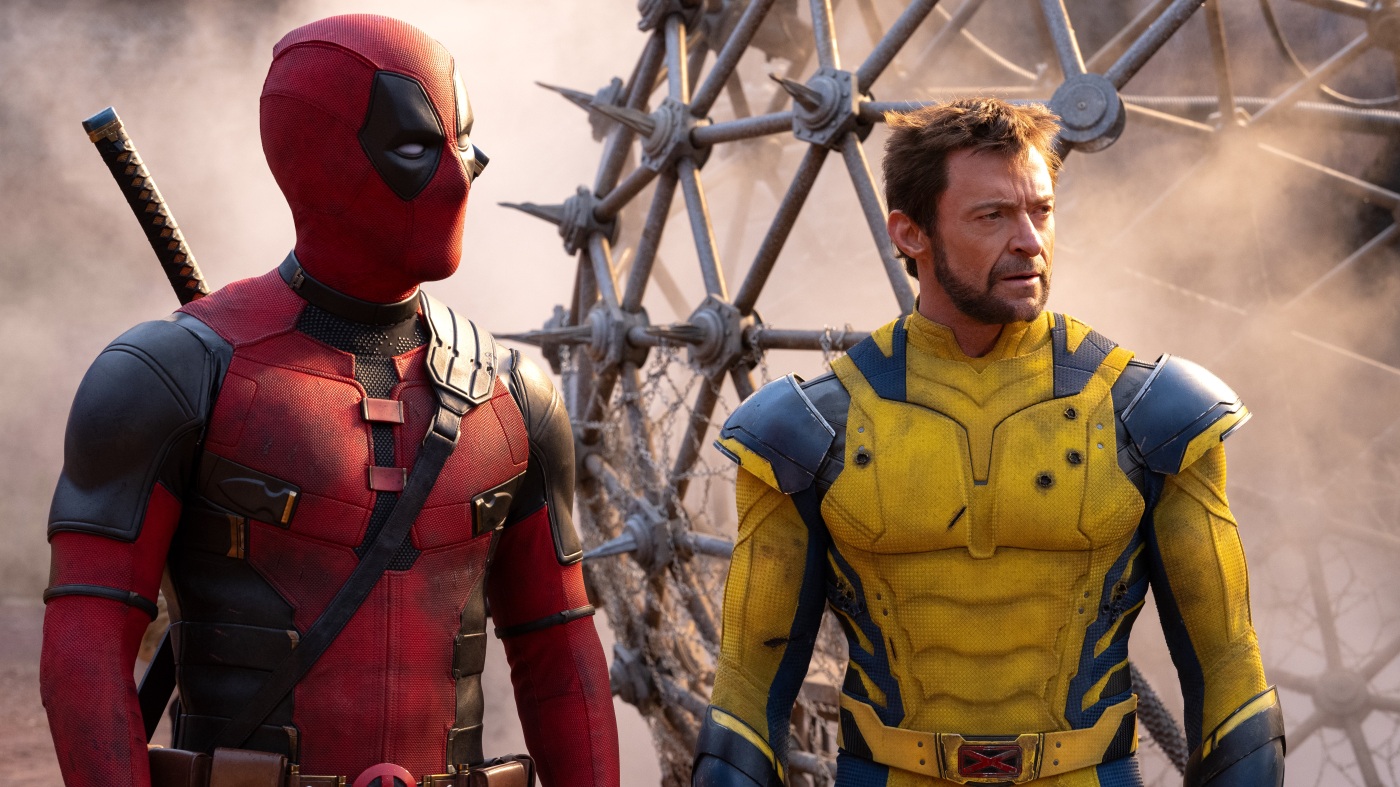
Ryan Reynolds stars as Deadpool and Hugh Jackman as Wolverine in an odd-couple action hero pairing.
Jay Maidment/20th Century Studios
hide caption
toggle caption
Jay Maidment/20th Century Studios
When Fox Studios released the first Deadpool movie back in 2016, it played like an irreverently funny antidote to our collective comic-book-movie fatigue. Wade Wilson, or Deadpool, was a foul-mouthed mercenary who obliterated his enemies and the fourth wall with the same gonzo energy.
Again and again, Deadpool turned to the camera and mocked the clichés of the superhero movie with such deadpan wit, you almost forgot you were watching a superhero movie. And Ryan Reynolds, Hollywood’s snarkiest leading man, might have been engineered in a lab to play this vulgar vigilante. I liked the movie well enough, though one was plenty; by the time Deadpool 2 rolled around in 2018, all that self-aware humor had started to seem awfully self-satisfied.
Now we have a third movie, Deadpool & Wolverine, which came about through some recent movie-industry machinations. When Disney bought Fox a few years ago, Deadpool, along with other mutant characters from the X-Men series, officially joined the franchise juggernaut known as the Marvel Cinematic Universe.
That puts the new movie in an almost interesting bind. It tries to poke fun at its tortured corporate parentage; one of the first things Deadpool says is “Marvel’s so stupid.” But now the movie also has to fit into the narrative parameters of the MCU. It tries to have it both ways: brand extension disguised as a satire of brand extension.

It’s also an odd-couple comedy, pairing Deadpool with the most famous of the X-Men: Logan, or Wolverine, the mutant with the unbreakable bones and the retractable metal claws, played as ever by a bulked-up Hugh Jackman.
The combo makes sense, and not just because both characters are Canadian. In earlier movies, Deadpool often made Wolverine the off-screen butt of his jokes. Both Deadpool and Wolverine are essentially immortal, their bodies capable of self-regenerating after being wounded. Both are tormented by past failures and are trying to redeem themselves. Onscreen, the two have a good, thorny chemistry, with Jackman’s brooding silences contrasting nicely with Reynolds’ mile-a-minute delivery.
I could tell you more about the story, but only at the risk of incurring the wrath of studio publicists who have asked critics not to discuss the plot or the movie’s many, many cameos. Let’s just say that the director Shawn Levy and his army of screenwriters bring the two leads together through various rifts in the multiverse. Yes, the multiverse, that ever-elastic comic-book conceit, with numerous Deadpools and Wolverines from various alternate realities popping up along the way.

I suppose it’s safe to mention that Matthew Macfadyen, lately of Succession, plays some kind of sinister multiverse bureaucrat, while Emma Corrin, of The Crown, plays a nasty villain in exile. It’s all thin, derivative stuff, and the script’s various wink-wink nods to other shows and movies, from Back to the Future to Furiosa to The Great British Bake Off, don’t make it feel much fresher. And Levy, who previously directed Reynolds in the sci-fi comedies Free Guy and The Adam Project, doesn’t have much feel for the splattery violence that is a staple of the Deadpool movies. There’s more tedium than excitement in the characters’ bone-crunching, crotch-stabbing killing sprees, complete with corn-syrupy geysers of blood.

For all its carnage, its strenuous meta-humor and an R-rated sensibility that tests the generally PG-13 confines of the MCU, Deadpool & Wolverine does strive for sincerity at times. Some of its cameos and plot turns are clearly designed to pay tribute to Fox’s X-Men films from the early 2000s.
As a longtime X-Men fan myself, I’m not entirely immune to the charms of this approach; there’s one casting choice, in particular, that made me smile, almost in spite of myself. It’s not enough to make the movie feel like less of a self-cannibalizing slog, though I suspect that many in the audience, who live for this kind of glib fan service, won’t mind. Say what you will about Marvel — I certainly have — but it isn’t nearly as stupid as Deadpool says it is.

-

 World1 week ago
World1 week agoOne dead after car crashes into restaurant in Paris
-

 Midwest1 week ago
Midwest1 week agoMichigan rep posts video response to Stephen Colbert's joke about his RNC speech: 'Touché'
-

 News1 week ago
News1 week agoVideo: Young Republicans on Why Their Party Isn’t Reaching Gen Z (And What They Can Do About It)
-

 Movie Reviews1 week ago
Movie Reviews1 week agoMovie Review: A new generation drives into the storm in rousing ‘Twisters’
-

 News1 week ago
News1 week agoIn Milwaukee, Black Voters Struggle to Find a Home With Either Party
-

 Politics1 week ago
Politics1 week agoFox News Politics: The Call is Coming from Inside the House
-

 News1 week ago
News1 week agoVideo: J.D. Vance Accepts Vice-Presidential Nomination
-

 World1 week ago
World1 week agoTrump to take RNC stage for first speech since assassination attempt















